计算机系统概论ICS Chapter 6 and after
Data Structure
用汇编实现...
Subroutine,JSR,JSRR,RET
汇编中的"函数" 调用函数用的是J
-
JSR LABEL将原来PC的值放入R7,跳到LABEL对应的命令(PC+offset) -
RET从子过程中返回,将PC设为R7 相当于JMP R7 -
JSRR Rn将原来PC的值放入R7,跳到Rn存储的地址(baseR) -
JMP Rn只跳转PC=Rn,但不会保存原来PC
Call-return:
Caller Save/Callee Save
子过程的计算过程中需要寄存器,防止对主过程干扰。在子过程中先把原来寄存器的值存在内存里,计算完成后再恢复寄存器的值 局部变量要Save,返回值不用Save Figure 8.1
Stack
Figure 8.11 P359 Overflow/Underflow
Queue
-
FRONT: point to the location just before the first element of the queue.
-
REAR: point to the location containing the most recent element that was added to the queue
- Empty:
FRONT==REAR - Overflow
FRONT=REAR+1
Recursion
如果连续调用了多个/次subroutine,只使用JSR和RET是回不去的,因为PC寄存器只有一个,只能回到上一个调用JSR的地方然后无限循环
利用栈进行函数调用 R6是栈指针
把当前过程用到的所有局部变量,指令存储的地址(JSR中被放到R7),函数的返回值都放到栈上
比如求阶乘 ans=f(n-1)*n 就需要放ans,n,R7
I/O
LC-3 memory
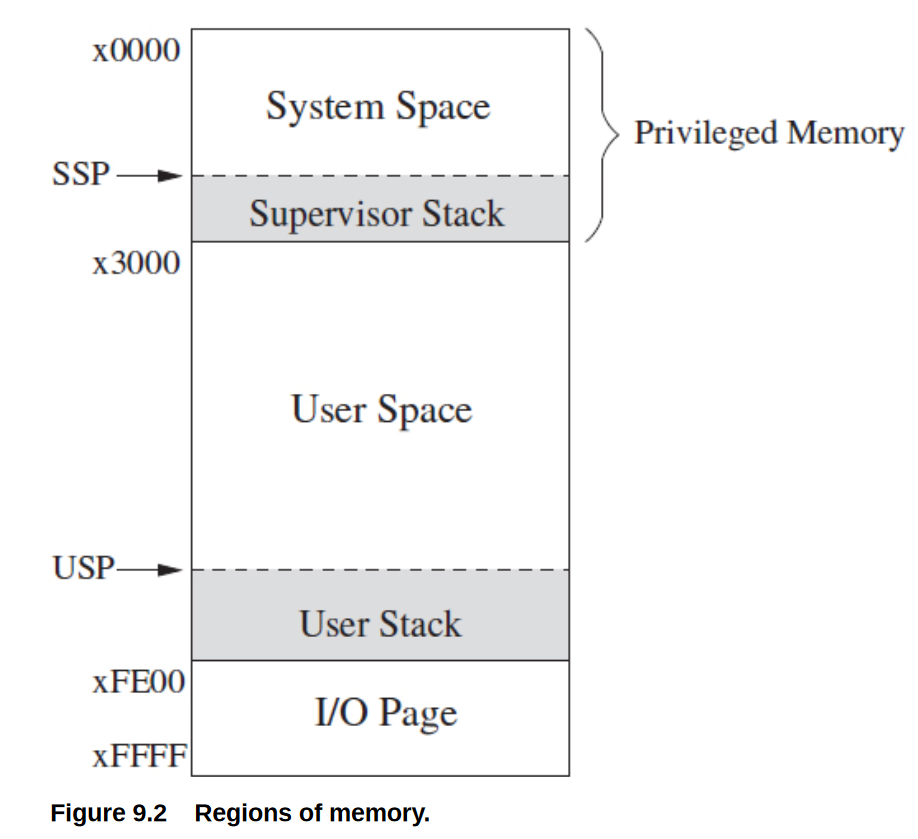
x3000-xFE00
memory-mapped I/O:
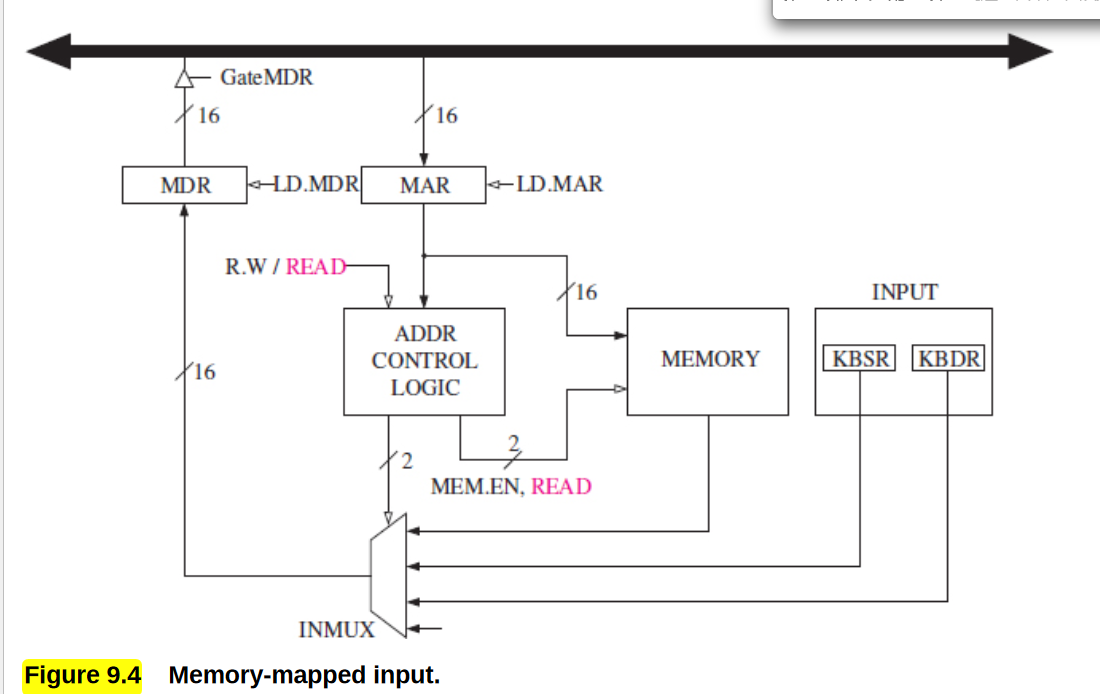 - Address control logic 控制访问的是内存,还是设备寄存器
- Addresses xFE00 to xFFFF are reserved for input/output device registers
- KBDR
- Address control logic 控制访问的是内存,还是设备寄存器
- Addresses xFE00 to xFFFF are reserved for input/output device registers
- KBDR xFE02 KBSR xFE00
Supervisor Stack Pointer (SSP) and User Stack Pointer (USP)
-
Register 6 is generally used as the stack pointer (SP) for the active stack.
-
Two registers, Saved_SSP and Saved_USP , are provided to save the SP not in use.
PSR
Privilege: the right to do something, such as execute a particular instruction or access a particular memory location.
Priority: the urgency of a program to execute.
两个概念没有关系。程序可以有高Priority,但低privilege(比如访问不了系统空间)

PSR[15]=0 means superisor privilege 注意0是supervisor,1才是用户
Basic Input-Output
异步asynchronous: 输入不会按CPU的时钟周期来
- interrupt-driven:
- polling:
KBSR xFE00KBDR xFE02 DSR xFE04 DDR xFE06
- Each time the typist types a character, KBSR[15] = 1. Each time the computer reads a character, KBSR[15] =0(硬件自动实现)
- 显示器空闲时,DSR[15]=1。 显示器正在处理输出时,DSR[15]=0
Manual I/O code
.ORIG x2000 ;在系统区里,否则没有supervisor权限
;如果放在x3000,访问KBSR会出现Access Violation
START LDI R3,KBSR; .FILL命令,mem[KBSR]=xFE00,R3=mem[mem[KBSR]]
BRzp START ;test R3 input,如果第一位是0,就循环
LDI R0,KBDR
BRnzp NEXT_TASK
KBSR .FILL xFE00
KBDR .FILL xFE02
START STI R3,DSR
BRzp START
STI R0,DDR
KBSR[14]是interrupt enable bit,设为1时输入会导致中断,跳到x0180
IO实现的一些细节
回显:直接读完KBDR后显示是没有任何变化的,读取完后再将读取的字符输出,这样的显示效果才符合我们平时用命令行的操作
TRAP
程序请求操作系统接管,执行一些操作(service routine)。这些操作是写好存在内存里的
Trap vector: 8bit \(2^8=256\)
Trap vector table: starting addresses of these 256 service routines.(0000-00FF)
TRAP instruction
Execute phase:
- PSR and PC are both pushed onto the system stack (a linkage back to the user program)
-
If the the program is executing in User mode(PSR[15]=1), the USP must be saved and the SSP load
-
PSR[15]=0
-
PC=mem[ZEXT(trapvector)]
-
-
RTI instruction
opcode=1000, no operands
-
pop PC and PSR
-
set PSR[15] 0 or 1
-
If
[PSR[15]]=1, load USP and save SS
SP是当前的栈指针,一般用R6
Saved_SSP和Saved_USP是两个寄存器 (见Figure C.8
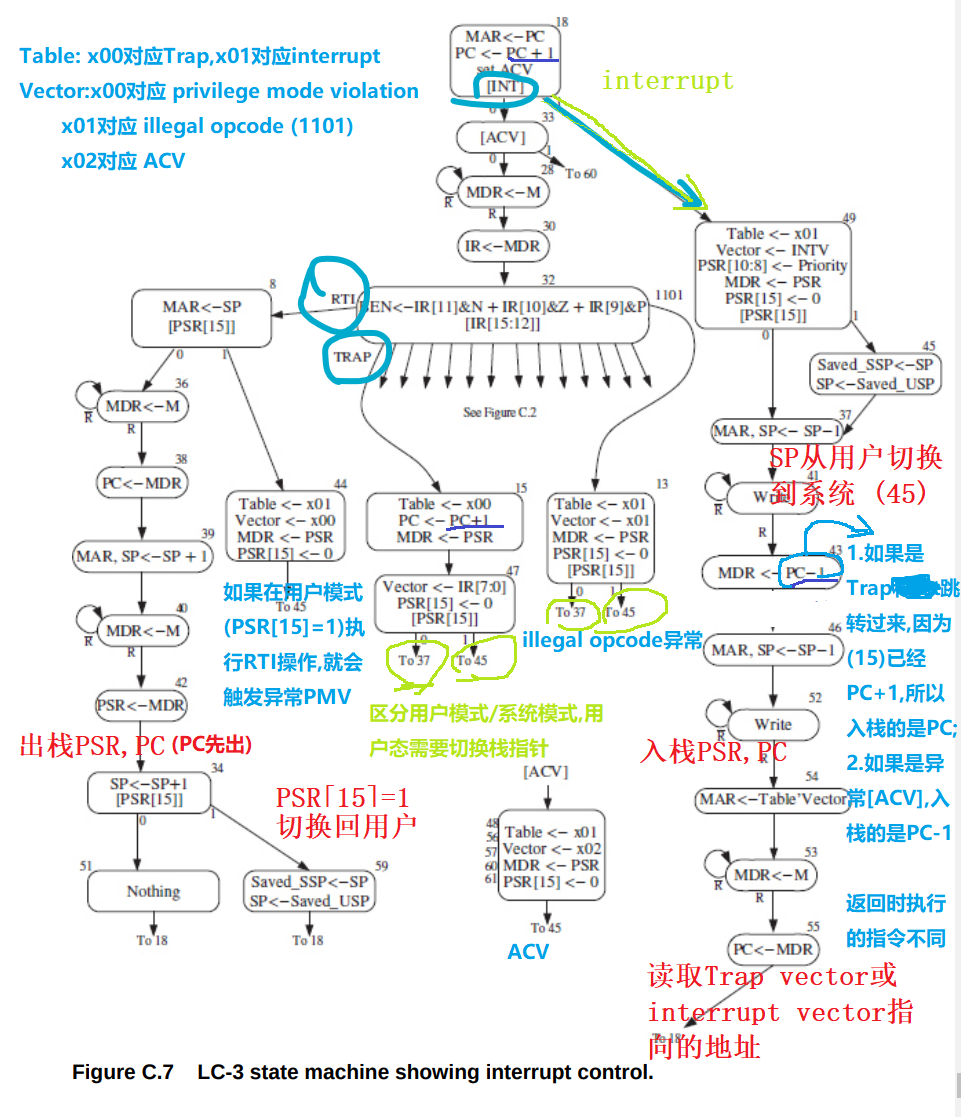
Trap访问内存3次(两个入栈,一个读取地址)
Trap vector及其功能
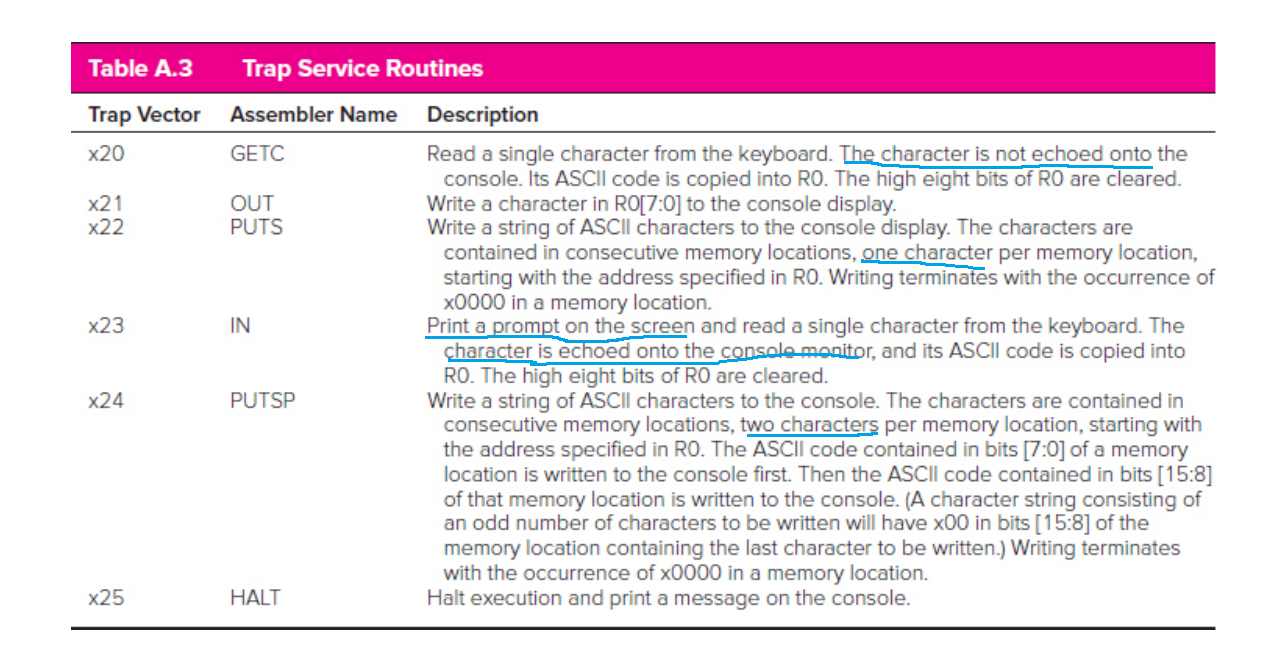
mem[x0020]里面存的是x0300,对应输入操作的起始地址
HALT把MCR的第一位设为0
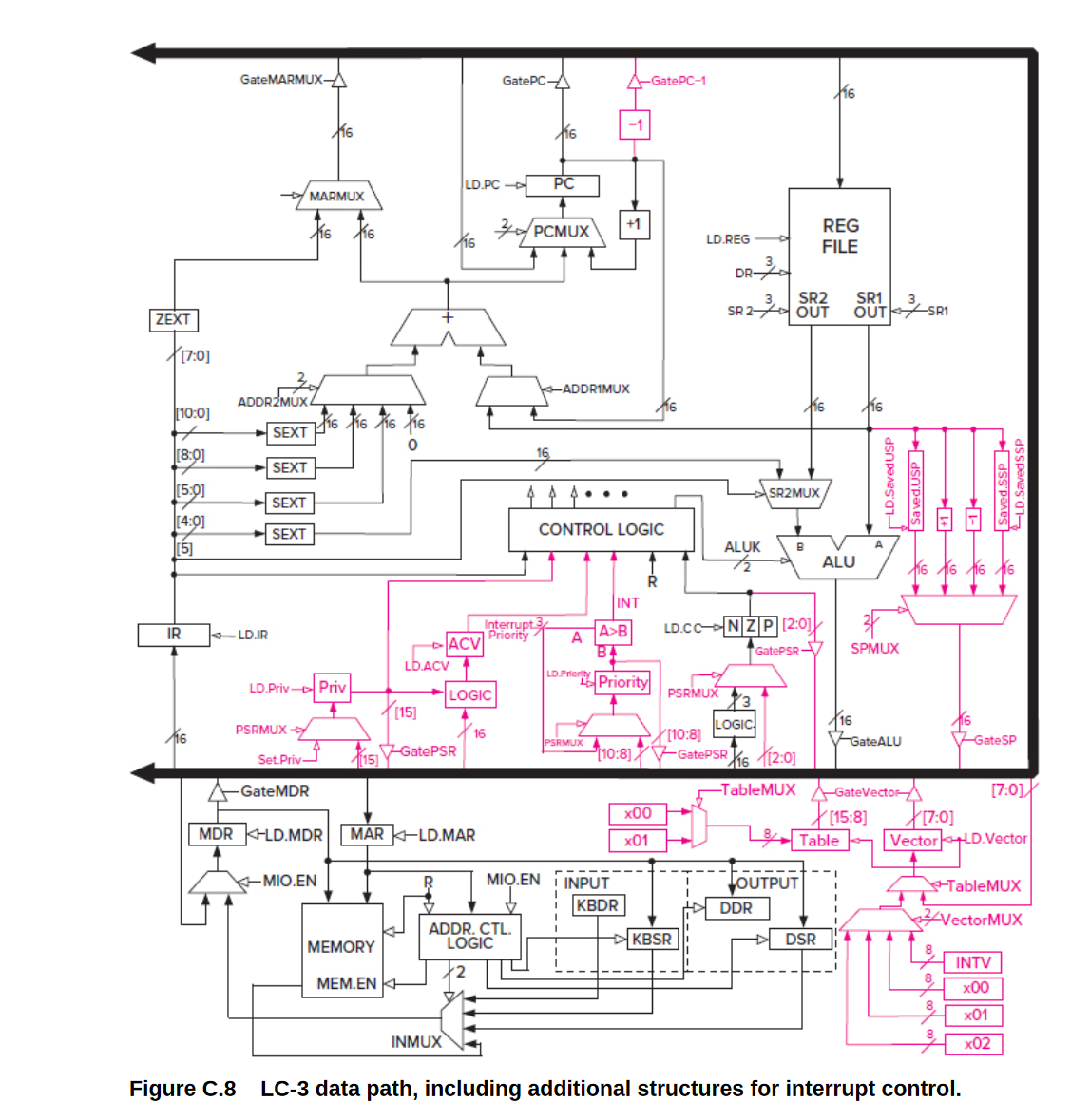
Interrupt
Trap是软件请求操作系统接管(软中断)
Interrupt是硬件(如IO)导致的中断 (硬中断)
Interrupt Vector Table: x0100-x01FF
跳转过程和Trap类似,看Figure C.7
Exception
对应Interrupt vector x0100,x0101,x0102
-
The privilege mode violation: occurs if the processor attempts to execute the RTI instruction while running in User mode.
-
The illegal opcode exception occurs if the processor attempts to execute an instruction having the unused opcode (bits [15:12] = 1101).
- The ACV exception occurs if the processor attempts to access privileged memory (i.e., a memory location in system space or a device register having an address from xFE00 to xFFFF while running in User mode
TRAP 回到PC
Interrupt回到PC-1 (当前指令),Exception回到PC-1 (当前引起异常的指令)